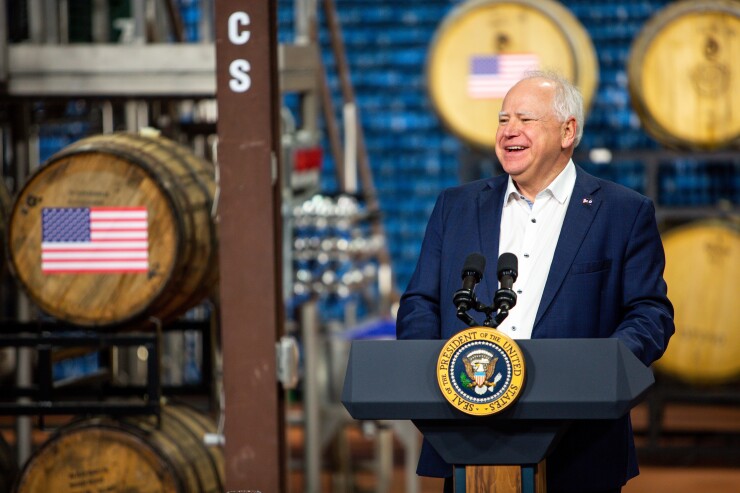
WASHINGTON — Minnesota Governor Tim Walz, whom Vice President Kamala Harris selected as her pick for vice president on the Democratic ticket Tuesday, has a shallow but broad experience in financial issues that could preview a more progressive stance toward banking issues in a Harris administration.
"The Walz pick suggests there will be a voice in the West Wing for the progressive policy agenda of Sen. Elizabeth Warren and CFPB Director Rohit Chopra," wrote Seiberg in a note. "Other leading [vice presidential] contenders would have sent a better signal that Harris intends to moderate some Team Biden approaches to financial regulation, especially when it comes to the Consumer Financial Protection Bureau."
Tim Walz, born in West Point, Nebraska, in 1964, is the 41st governor of Minnesota, serving since January 2019. Prior to politics, Walz spent 24 years in the Army National Guard, where he retired as a command sergeant major. He also worked as a high school teacher and football coach before election to public office in 2006, representing Minnesota's 1st Congressional District in the U.S. House of Representatives. Known for his pragmatic but progressive politics, Walz steered Minnesota through the COVID-19 pandemic and won reelection in the purple state in 2022 by 7 points.
As governor — and with only a one-vote majority in the state Senate — Walz has signed a swath of progressive reforms, including a major expansion of labor rights, new paid family and medical leave and legalizing recreational marijuana since first being elected in 2018.
The Minnesota Chamber of Commerce expressed simultaneous admiration for Walz's distinguished public service and military record, while also noting where his progressive stances conflict with aspects of their business agenda. With Walz's exit, Democratic Lieutenant Governor Peggy Flanagan would take the governorship until an election in 2026.
"Gov. Walz has had a long record of serving Minnesotans in the national guard, Congress and as governor during challenging times[, but] there have been missed opportunities during his tenure to make Minnesota's economy more competitive," said Doug Loon, the Chamber's president and CEO. "Many progressive policies passed by the legislature and signed by the governor have limited the private sector from reaching its economic potential."
Meanwhile, Joe Witt, president and CEO of the Minnesota Bankers Association, issued a statement critical of the tax and business climate in the state but stopped short of criticizing Walz or his administration, with which he said the MBA has a "good" working relationship.
"The business environment in Minnesota has been challenging, mainly due to new employment laws and the business tax climate, but the MBA has a good working relationship with the Department of Commerce, the state bank regulator in Minnesota," Witt said.
Before becoming Minnesota governor in 2019, Walz was one of only two House Democrats who abstained from voting on the 2018 bipartisan banking bill, the Economic Growth, Regulatory Relief, and Consumer Protection Act, also known as S.2155 or the "Crapo Bill." The bill lowered the threshold for banks to be considered systemically important financial institutions and spurred a 2018 "tailoring rule" by the Fed that the central bank later said
Walz has demonstrated some interest in protecting consumers from financial abuse, as well as providing flexibility for financial institutions in Minnesota.
Walz also signed a bill in May 2022
Governor Walz has also supported initiatives to improve Black banking access, championing the opening of First Independence Bank, a full-service, Black-owned bank in
During the 2008 economic crisis, then-Congressman Walz stood firmly against using taxpayer money to bail out financial institutions. In late September, he cast a vote against the $700 billion Troubled Assets Relief bill, which was intended to finance the purchase of troubled assets from struggling banks. Walz criticized the bill for not recovering taxpayer losses, offering insufficient support to average homeowners and lacking adequate oversight of Wall Street.
Left-leaning groups have already come out and voiced their support for the pick. Felicia Wong, president and CEO of Roosevelt Forward — the advocacy affiliate of the Roosevelt Institute, a progressive economic think tank — praised Walz's selection, but primarily for his pro-consumer stances rather than any strong positions on financial issues.
"Gov. Tim Walz has shown he knows about governing; spending political capital to improve lives. We applaud his commitment to paid leave, reducing child poverty, free college and a just energy transition," she said. "Gov. Walz also understands the importance of using public power to hold corporations to account. He signed a right-to-repair bill for digital devices and a bill to limit or block harmful hospital mergers."






